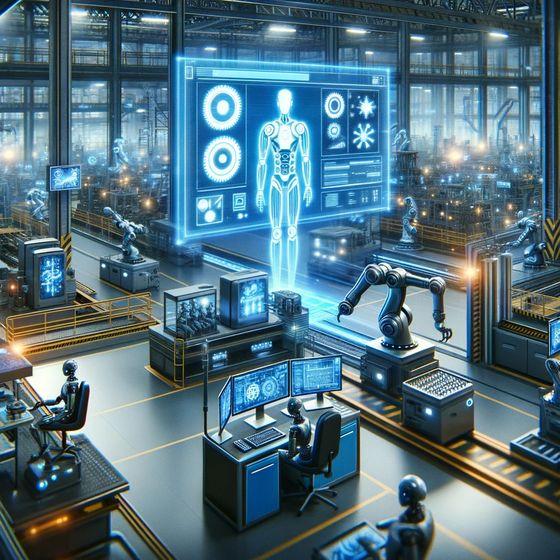AI and ChatGPT - Revolutionizing the Manufacturing Industry
How AI and Conversational Technologies are Transforming Industrial Processes

The application of artificial intelligence (AI) in various industries, particularly in manufacturing, is a topic of growing interest. The evolution of technologies like ChatGPT is driving significant changes in this sector. For a more nuanced understanding, we reference four informative blog posts from our team members. The first post, "AI Use Cases that are shaping the next manufacturing frontier", offers an insightful overview of AI's role in diverse areas. Following this, "ChatGPT AI Assistants with Node-RED" examines the specific impact of AI assistants. The third article, "Node-Red Builder a ChatGPT GPT", discusses the capabilities of generative pre-trained transformers like ChatGPT. Lastly, "How ChatGPT improves Node-RED Developer Experience" explores ChatGPT's application in Node-Red development, an important aspect for many in manufacturing.
# How AI and ChatGPT are Impacting Manufacturing
AI and ChatGPT's integration into manufacturing indicates a shift in production process management. Here are some key impacts:
# Boosting Efficiency and Productivity
AI, especially ChatGPT, enhances manufacturing efficiency by analyzing data to improve production lines, predict maintenance, and aid in design and development.
# Automating Routine Tasks
AI is adept at handling repetitive tasks, speeding up manufacturing and allowing human workers to engage in more complex production aspects.
# Elevating Quality Control
AI algorithms consistently ensure high-quality standards, quickly identifying and fixing product defects or deviations.
# Enabling Customization and Flexibility
AI's learning and adaptability make it suitable for customizing production, allowing manufacturers to meet specific customer demands more efficiently.
# Transforming the Workforce
AI in manufacturing necessitates skilled workers to operate and maintain these systems, altering job roles and responsibilities.
# Pros and Cons of AI and ChatGPT in Manufacturing
# Pros
- Boosted Productivity: AI-driven automation increases production efficiency.
- Consistent Quality Assurance: AI ensures ongoing product quality.
- Reduced Costs: AI optimizes resource use and minimizes waste.
- Encouraging Innovation: AI facilitates new manufacturing methods and products.
- Enhancing Safety: AI reduces human exposure to hazardous manufacturing conditions.
# Cons
- Initial Investment Costs: AI technology implementation can be expensive.
- Need for Skilled Labor: Demand for workers proficient in AI technologies is growing.
- Job Role Changes: Automation might decrease the need for certain labor roles.
- Security Concerns: AI systems can be susceptible to cyber threats.
- Technological Dependence: Excessive reliance on AI could limit problem-solving abilities in workers.
# Frequently Asked Questions (FAQs)
1. How is AI changing manufacturing?
AI is altering manufacturing through automation, optimizing efficiency, and fostering production innovations.
2. What is ChatGPT's role in manufacturing?
ChatGPT aids in data analysis, automates processes, and improves communication and documentation in manufacturing.
3. Are manufacturing jobs at risk due to AI?
While AI may automate some repetitive jobs, it also creates opportunities for skilled labor in technology management and development.
4. Can AI enhance manufacturing product quality?
Yes, AI's continuous monitoring and analysis significantly boost quality control.
5. What are the main challenges of integrating AI in manufacturing?
Challenges include high implementation costs, the need for skilled labor, and transitioning to automated processes.
6. Is AI cost-effective in manufacturing?
Despite high initial costs, AI can lead to long-term savings through improved efficiency and waste reduction.
7. How does AI affect manufacturing worker safety?
AI reduces risk by taking over hazardous tasks, improving overall workplace safety.
8. Can small manufacturers benefit from AI?
Yes, AI solutions are increasingly accessible for small-scale manufacturers.
9. What training is required for AI-enabled manufacturing workers?
Training in AI system operation, data analysis, and potentially programming skills is needed.
10. What does the future hold for AI in manufacturing?
The future suggests more integrated, intelligent, and adaptable manufacturing processes driven by AI advancements.
Written By:
Published on:
Related Articles:
- Evolution of Technology: Impact on Job Roles and Companies
- FlowFuse 2.6: AI Infused Node-RED, Persistent File Storage & Lots More
- New Charts Available in FlowFuse Dashboard
- Building on FlowFuse: Remote Device Monitoring
- Deploying FlowFuse with Docker on an Ubuntu server